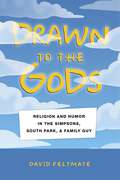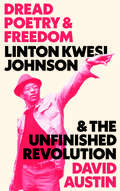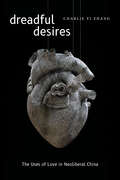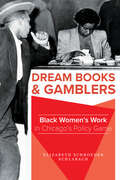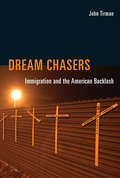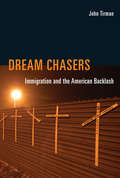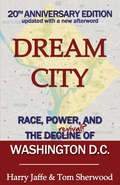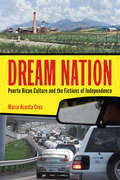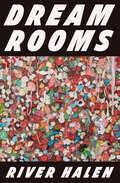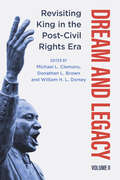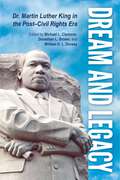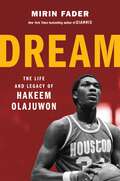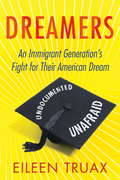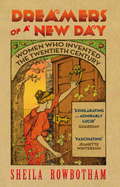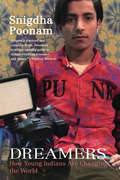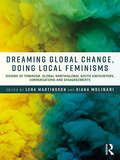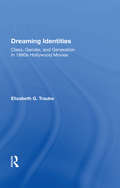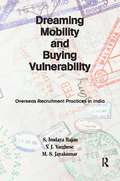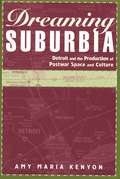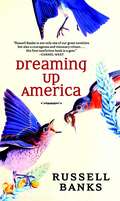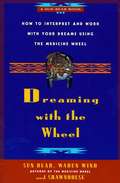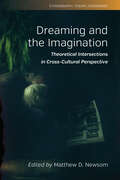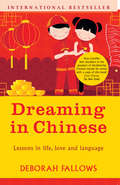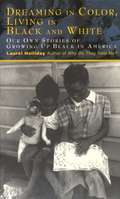- Table View
- List View
Drawn to the Gods: Religion and Humor in The Simpsons, South Park, and Family Guy
by David FeltmateA new world of religious satire illuminated through the layers of religion and humor that make up the The Simpsons, South Park and Family Guy.Drawing on the worldviews put forth by three wildly popular animated shows – The Simpsons, South Park, and Family Guy– David Feltmate demonstrates how ideas about religion’s proper place in American society are communicated through comedy. The book includes discussion of a wide range of American religions, including Protestant and Catholic Christianity, Judaism, Islam, Buddhism, Native American Religions, New Religious Movements, “Spirituality,” Hinduism, and Atheism. Along the way, readers are shown that jokes about religion are influential tools for teaching viewers how to interpret and judge religious people and institutions. Feltmate, develops a picture of how each show understands and communicates what constitutes good religious practice as well as which traditions they seek to exclude on the basis of race and ethnicity, stupidity, or danger. From Homer Simpson’s spiritual journey during a chili-pepper induced hallucination to South Park’s boxing match between Jesus and Satan to Peter Griffin’s worship of the Fonz, each show uses humor to convey a broader commentary about the role of religion in public life. Through this examination, an understanding of what it means to each program to be a good religious American becomes clear. Drawn to the Gods is a book that both fans and scholars will enjoy as they expose the significance of religious satire in these iconic television programs.
Dread Poetry and Freedom: Linton Kwesi Johnson and the Unfinished Revolution
by David AustinSince the 1970s, poet Linton Kwesi Johnson has been putting pen to paper to refute W.H. Auden’s claim that “poetry makes nothing happen.” For Johnson, only the second living poet to have been published in the Penguin Modern Classics series, writing has always been “a political act” and poetry “a cultural weapon.” In Dread Poetry and Freedom David Austin explores the themes of poetry, political consciousness, and social transformation through the prism of Johnson’s work. Drawing from the Bible, reggae and Rastafari, and surrealism, socialism, and feminism, and in dialogue with Aimé Césaire and Frantz Fanon, C.L.R. James and Walter Rodney, W.E.B. Du Bois and the poetry of d’bi young anitafrika, Johnson’s work becomes a crucial point of reflection on the meaning of freedom in this masterful and rich study.
Dreadful Desires: The Uses of Love in Neoliberal China (Thought in the Act)
by Charlie Yi ZhangIn Dreadful Desires Charlie Yi Zhang examines how the Chinese state deploys affective notions of love to regulate the population and secure China’s place in the global economy. Zhang shows how the state frames love as a set of desires that encompass heteronormative intimacy, familial and communal attachment, upward mobility, and private property ownership. These desires—as circulated in performance in the nationalistic ceremony, same-sex romantic fan fiction, the wildly popular reality television dating show If You Are the One, and the cult of patriarchal personality around Xi Jinping—are explicitly based in oppressive systems of gender, class, and sexuality. Zhang contends that such desires connect love to economic survival and gender normativity in ways that underwrite Chinese neoliberalism at the expense of individual flourishing. By outlining how state-framed forms of love create desires that cannot be fulfilled, Zhang places China at the forefront of using affective attachments to nation, leader, and family in the global shifts toward exploitation and authoritarianism.
Dream Books and Gamblers: Black Women's Work in Chicago's Policy Game
by Elizabeth Schroeder SchlabachUbiquitous illegal lotteries known as policy flourished in Chicago’s Black community during the overlapping waves of the Great Migration. Policy “queens” owned stakes in lucrative operations while women writers and clerks canvased the neighborhood, passed out winnings, and kept the books. Elizabeth Schroeder Schlabach examines the complexities of Black women’s work in policy gambling. Policy provided Black women with a livelihood for themselves and their families. At the same time, navigating gender expectations, aggressive policing, and other hazards of the infromal economy led them to refashion ideas about Black womanhood and respectability. Policy earnings also funded above-board enterprises ranging from neighborhood businesses to philanthropic institutions, and Schlabach delves into the various ways Black women straddled the illegal policy business and reputable community involvement. Vivid and revealing, Dream Books and Gamblers tells the stories of Black women in the underground economy and how they used their work to balance the demands of living and laboring in Black Chicago.
Dream Chasers: Immigration and the American Backlash (The MIT Press)
by John TirmanIllegal immigration continues to roil American politics. The right-wing media stir up panic over "anchor babies," job stealing, welfare dependence, bilingualism, al-Qaeda terrorists disguised as Latinos, even a conspiracy by Latinos to "retake" the Southwest. State and local governments have passed more than 300 laws that attempt to restrict undocumented immigrants' access to hospitals, schools, food stamps, and driver's licenses. Federal immigration authorities stage factory raids that result in arrests, deportations, and broken families -- and leave owners scrambling to fill suddenly open jobs. The DREAM Act, which would grant permanent residency to high school graduates brought here as minors, is described as "amnesty." And yet polls show that a majority of Americans support some kind of path to citizenship for those here illegally. What is going on? In this book, John Tirman shows how the resistance to immigration in America is more cultural than political. Although cloaked in language about jobs and secure borders, the cultural resistance to immigration expresses a fear that immigrants are changing the dominant white, Protestant, "real American" culture.Tirman describes the "raid mentality" of our response to immigration, which seeks violent solutions for a social phenomenon. He considers the culture clash over Chicano ethnic studies in Tucson, examines the consequences of an immigration raid in New Bedford, and explores the civil rights activism of young "Dreamers." The current "round them up, deport them, militarize the border" approach, Tirman shows, solves nothing.
Dream Chasers: Immigration and the American Backlash (The\mit Press Ser.)
by John TirmanHow the immigration battle plays out in America, from curriculum disputes to federal raids to the civil rights activism of young “Dreamers.” Illegal immigration continues to roil American politics. The right-wing media stir up panic over “anchor babies,” job stealing, welfare dependence, bilingualism, al-Qaeda terrorists disguised as Latinos, even a conspiracy by Latinos to “retake” the Southwest. State and local governments have passed more than 300 laws that attempt to restrict undocumented immigrants' access to hospitals, schools, food stamps, and driver's licenses. Federal immigration authorities stage factory raids that result in arrests, deportations, and broken families—and leave owners scrambling to fill suddenly open jobs. The DREAM Act, which would grant permanent residency to high school graduates brought here as minors, is described as “amnesty.” And yet polls show that a majority of Americans support some kind of path to citizenship for those here illegally. What is going on? In this book, John Tirman shows how the resistance to immigration in America is more cultural than political. Although cloaked in language about jobs and secure borders, the cultural resistance to immigration expresses a fear that immigrants are changing the dominant white, Protestant, “real American” culture.Tirman describes the “raid mentality” of our response to immigration, which seeks violent solutions for a social phenomenon. He considers the culture clash over Chicano ethnic studies in Tucson, examines the consequences of an immigration raid in New Bedford, and explores the civil rights activism of young “Dreamers.” The current “round them up, deport them, militarize the border” approach, Tirman shows, solves nothing.
Dream City
by Tom Sherwood Harry S. JaffeWith a new afterword covering the two decades since its first publication, two of Washington, D.C.'s most respected journalists expose one of America's most tragic ironies: how the nation's capital, often a gleaming symbol of peace and hope, is the setting for vicious contradictions and devastating conflicts over race, class, and power. Jaffe and Sherwood have chillingly chronicled the descent of the District of Columbia-congressional hearings, gangland murders, the establishment of home rule and the inside story of Marion Barry's enigmatic dynasty and disgrace. Now their afterword narrates the District's transformation in the last twenty years. New residents have helped bring developments, restaurants, and businesses to reviving neighborhoods. The authors cover the rise and fall of Mayors Adrian Fenty and Vince Gray, how new corruption charges are taking down politicians and businessmen, and how a fading Barry is still a player. The "city behind the monuments" remains flawed and polarized, but its revival is turning it into a distinct world capital-almost a dream city.Harry Jaffe has been a national editor at The Washingtonian magazine since 1990. He has received a number of awards for investigative journalism and feature writing from the Society of Professional Journalists. He has taught journalism at Georgetown University and American University. His work has appeared in Esquire, Regardie's, Outside, Philadelphia Magazine, National Geographic Traveler, The Washington Post, The Los Angeles Times, The Chicago Tribune, and other newspapers. Jaffe was born and raised in Philadelphia and began his journalism career with the Rutland (Vermont) Herald. He is the co-author of Dream City: Race, Power and the Decline of Washington, D.C. He lives in Clarke County, Virginia, and Washington, D.C., with his wife and daughters.Tom Sherwood is a reporter for NBC4 in Washington, specializing in politics and the District of Columbia government. Tom also is a commentator for WAMU 88.5 public radio and a columnist for the Current Newspapers. Tom has twice been honored as one of the Top 50 Journalists in Washington by Washingtonian magazine. He began his journalism career at The Atlanta Constitution and covered local and national politics for The Washington Post from 1979 to 1989. He is the co-author of Dream City: Race, Power and the Decline of Washington, D.C. A native of Atlanta, he currently resides in Washington, D.C. and has one son, Peyton.
Dream Nation: Puerto Rican Culture and the Fictions of Independence
by María Acosta CruzOver the past fifty years, Puerto Rican voters have roundly rejected any calls for national independence. Yet the rhetoric and iconography of independence have been defining features of Puerto Rican literature and culture. In the provocative new book Dream Nation, María Acosta Cruz investigates the roots and effects of this profound disconnect between cultural fantasy and political reality.Bringing together texts from Puerto Rican literature, history, and popular culture, Dream Nation shows how imaginings of national independence have served many competing purposes. They have given authority to the island's literary and artistic establishment but have also been a badge of countercultural cool. These ideas have been fueled both by nostalgia for an imagined past and by yearning for a better future. They have fostered local communities on the island, and still helped define Puerto Rican identity within U.S. Latino culture. In clear, accessible prose, Acosta Cruz takes us on a journey from the 1898 annexation of Puerto Rico to the elections of 2012, stopping at many cultural touchstones along the way, from the canonical literature of the Generación del 30 to the rap music of Tego Calderón. Dream Nation thus serves both as a testament to how stories, symbols, and heroes of independence have inspired the Puerto Rican imagination and as an urgent warning about how this culture has become detached from the everyday concerns of the island's people. A volume in the American Literature Initiatives series
Dream Rooms
by River HalenPart essay, part poem, part fever dream journal entry, Dream Rooms is a book about personal revolution, about unravelling a worldview to make space for different selves and realities. Set in the years that led up to author River Halen coming out as trans, this collection concerns itself with what sits on the surface of daily life, hidden in plain view, hungry for address—what it means to take a stranger's pet rabbit to the vet in a year of accelerating extinctions, to lose your clothes to a moth infestation then buy a duvet made of fossil fuels, to learn your bookshelf is full of work written by rapists and rape apologists, to consider a birth control device as a narrative about bodies and their possibilities, then pull the string.Written with precision, humour, and sweeping lyrical insight, this work moves effortlessly from microcosm to macrocosm and back again, demonstrating the inextricability of self and world and how a shift in language or understanding in one realm ripples out. Deeply queer and trans not only in its content but in its thinking, Dream Rooms invites readers to that place in consciousness where fear and desire, hidden information and common knowledge brush up against each other and are mutually transformed.
Dream and Legacy, Volume II: Revisiting King in the Post-Civil Rights Era
by Michael L. Clemons, Donathan L. Brown, and William H. L. DorseyContributions by Robert Adams Jr., Shenita Brazelton, Donathan L. Brown, Owen Brown Jr., LaTasha Chaffin, Michael L. Clemons, Daphne Cooper, William H. L. Dorsey, Bertis D. English, Precious D. Hall, Beverly A. Johnson, Maruice Mangum, Natasha Altema McNeely, Amardo Rodriguez, Randall Swain, Edward V. Wallace, Ingrid P. Whitaker, and Mark M. WhitakerBeginning early in his career, Dr. Martin Luther King Jr. recognized the moral and humanitarian need to pursue social justice and equity for marginalized Americans, those for whom the American dream had proven to be an elusive ideal. In Dream and Legacy, Volume II: Revisiting King in the Post–Civil Rights Era, contributors sift through the historical record, engaging one of America’s most consequential, radical historical traditions.Despite robust reform efforts since the 1930s, a wide range of policy-related challenges plague the lives of African Americans, other persons of color, women, and the poor in the twenty-first century. This anthology, like the first from coeditors Michael L. Clemons, Donathan L. Brown, and William H. L. Dorsey, applies the ideology and activism of Dr. King to its analysis of contemporary sociopolitical issues in the United States and abroad. The project begins with a foreword that situates the subsequent essays within the context of contemporary social developments. Grouped into themed sections, the essays cover such topics as voting rights, public protest, police brutality, poverty and wage discrimination, healthcare, and more. The epilogue concludes with a discussion of the timeless impact of Dr. King’s philosophy and activism, as well as the implications of his work for the future of domestic and global leadership. Dream and Legacy, Volume II identifies a variety of practical lessons that can help resolve contemporary social problems.
Dream and Legacy: Dr. Martin Luther King in the Post-Civil Rights Era
by Michael L. Clemons, Donathan L. Brown, and William H. L. DorseyContributions by Rosa M. Banda, Lakeyta M. Bonnette-Bailey, Donathan L. Brown, Michael L. Clemons, William H. L. Dorsey, Hannah Firdyiwek, Alonzo M. Flowers III, Helen Taylor Greene, William G. Jones, Athena M. King, Taj'ullah Sky Lark, Jamela M. Martin, Marcus L. Martin, Byron D'Andra Orey, Amardo Rodriguez, Audrey E. Snyder, James L. Taylor, Leslie Walker, and Jason M. WilliamsThis book examines how Martin Luther King's life and work had a profound, if unpredictable, impact on the course of the United States since the civil rights era. A global icon of freedom, justice, and equality, King is recognized worldwide as a beacon in the struggles of peoples seeking to eradicate oppression, entrenched poverty, social deprivation, as well as political and economic disfranchisement. While Dr. King's work and ideas have gained broad traction, some powerful people misappropriate the symbol of King, skewing his legacy.With unique, multidisciplinary works by scholars from around the country, this anthology focuses on contemporary social policies and issues in America. Collectively, these pieces explore wide-ranging issues and contemporary social developments through the lens of Dr. King's perceptions, analysis, and prescriptions. Essayists bring a multidisciplinary and interdisciplinary approach to social policies and current issues in light of his ideals. They strive to glean new approaches and solutions that comport with Dr. King's vision.Organized into three sections, the book focuses on selected issues in contemporary domestic politics and policy, foreign policy and foreign affairs, and social developments that impinge upon African Americans and Americans in general. Essays shed light on Dr. King's perspective related to crime and justice, the right to vote, the hip hop movement, American foreign policy in the Middle East and Africa, healthcare, and other pressing issues. This book infers what Dr. King's response and actions might be on important and problematic contemporary policy and social issues that have arisen in the post-civil rights era.
Dream: The Life and Legacy of Hakeem Olajuwon
by Mirin FaderThe life and legacy of pioneering international basketball superstar Hakeem Olajuwon, a two‑time NBA champion whose Hall of Fame career forever changed the game, both in the United States and around the globe—from the New York Times bestselling author of Giannis, Mirin Fader. It&’s now the norm for NBA and collegiate teams to have international players dotting their rosters. The Olympics are no longer a gimme for Team USA. Both via fans streaming from all over the globe and leagues starting in countries throughout the world, the international presence of the game of basketball is a force to be reckoned with. That all started with Hakeem &“the Dream&” Olajuwon. He was the first international player to win the MVP, which is hard to believe now considering the last time an American‑born player won it was in 2018. Award-winning hoops journalist Mirin Fader explores this phenomenal shift through the lens of what Olajuwon accomplished throughout the 1980s and &‘90s. Dream ignites nostalgia for Phi Slama Jama and &“the Dream Shake,&” while also exploring the profound influence of Olajuwon&’s commitment to Islam on his approach to life and basketball, and how his devotion to his faith inspired generations of Muslim people around the world. Olajuwon&’s ongoing work with NBA Africa, his status as an international ambassador for the game, and his consultations with today&’s brightest stars, from LeBron James to Giannis Antetokounmpo, brings the story right up to the present moment, and beyond. Synthesizing hundreds of interviews and in-depth research, Fader provides the definitive biography of Olajuwon as well as a crucial understanding of his pivotal impact on the ever-shifting game.
Dreamers
by Eileen TruaxDreamers is a movement book for the generation brought to the United States as children--and now fighting to live here legally Of the approximately twelve million undocumented immigrants living in the United States, as many as two million came as children. They grow up here, going to elementary, middle, and high school, and then the country they call home won't--in most states--offer financial aid for college and they're unable to be legally employed. In 2001, US senator Dick Durbin introduced the DREAM Act to Congress, an initiative that would allow these young people to become legal residents if they met certain requirements. And now, more than ten years later, in the face of congressional inertia and furious opposition from some, the DREAM Act has yet to be passed. But recently, this young generation has begun organizing, and with their rallying cry "Undocumented, Unapologetic, and Unafraid" they are the newest face of the human rights movement. In Dreamers, Eileen Truax illuminates the stories of these men and women who are living proof of a complex and sometimes hidden political reality that calls into question what it truly means to be American.From the Trade Paperback edition.
Dreamers of a New Day
by Sheila RowbothamFrom the 1880s to the 1920s, a profound social awakening among women extended the possibilities of change far beyond the struggle for the vote. Amid the growth of globalized trade, mass production, immigration and urban slums, American and British women broke with custom and prejudice. Taking off corsets, forming free unions, living communally, buying ethically, joining trade unions, doing social work in settlements, these "dreamers of a new day" challenged ideas about sexuality, mothering, housework, the economy and citizenship. Drawing on a wealth of research, Sheila Rowbotham has written a groundbreaking new history that shows how women created much of the fabric of modern life. These innovative dreamers raised questions that remain at the forefront of our twenty-first-century lives.
Dreamers: How Young Indians Are Changing the World
by Snigdha PoonamSnigdha Poonam traveled through towns in northern India to investigate millennials, who are nothing like their Western counterparts. In a country of exceptional ambition, crushing limitations, and toxic masculinity, she found clickbaiters, scammers, and hucksters, but also strivers and student leaders hungry for change—a generation of dreamers.
Dreaming Down the Track: Awakenings in Aboriginal Cinema
by William LempertWhat can Aboriginal filmmaking reveal about Indigenous presence and futures? The product of years of embedded fieldwork within Indigenous film crews in Northwestern Australia, Dreaming Down the Track delves deeply into Aboriginal cinema as a transformative community process. It follows the social lives of projects throughout their production cycles, from planning and editing to screening, broadcasting, and after-images. Across its narrative sweep, this ethnography engages the film career of Kukatja elder Mark Moora to demonstrate the impact of filmmaking on how Aboriginal futures are collectively imagined and called forth. William Lempert highlights a series of awakenings through which Moora ultimately came to view cinema as a process for catalyzing his family&’s return to their home country of Mangkayi. This biographical media journey paints an intimate portrait of the inspiring possibilities and sobering limitations of Indigenous envisioning within settler states. Lempert traces how Moora&’s life and films convey a multiplicity of Aboriginal experiences across time and space, from colonial contact to contemporary life in communities like Balgo, including the continued governmental attempts to undermine them. Amid ongoing negotiations to establish the first treaties between Indigenous nations and Australian states, Dreaming Down the Track illustrates what is at stake in how Aboriginal–State relations are represented and understood, both within communities and for the broader public. Lempert stays true to Moora&’s insight that film can preserve community stories for generations to come, toward the aim of enacting sovereign futures.
Dreaming Global Change, Doing Local Feminisms: Visions of Feminism. Global North/Global South Encounters, Conversations and Disagreements
by Diana Mulinari Lena MartinssonIn a world where frontiers are militarised and classifications systems defining rights and belonging are reinforced, transnational feminist agendas are fundamental. We use the concept of ‘scholarships of hope’ to analyse the diversity of feminist struggles and imaginaries in diverse geopolitical locations. Dreaming Global Change, Doing Local Feminisms explores subversive practices of knowledge production that challenge Eurocentric scientific models and agendas. The book also explores the tensions and challenges of doing transnational feminist theory at the crossroads between feminist scholarship and feminist activism. In conjunction, these chapters provide a solid analysis framed by feminist methodologies opening complexities and contradictions of individual and collective feminist and trans identity struggles in Argentina, Belarus, Pakistan, Sweden, Taiwan and Turkey. These identities and struggles are rooted in transnational and local genealogies that go beyond the narratives of the West as the origin for democracy and human rights, providing powerful agendas for alternative futures.
Dreaming Identities: Class, Gender, And Generation In 1980s Hollywood Movies
by Elizabeth G. TraubeIn this book Elizabeth Traube argues that over the course of the 1980s, Hollywood participated in a wider move by mainstream political and social forces that attempted to absorb and contain critical cultural currents by rehabilitating images of masculine authority. At the movies we saw parallel construetions of wild, antibureaucratic warrior-heroes and smooth, seemingly rebellious tricksters adapted to the corporate order. We saw the demonization of the independent woman and the complementary formation of the nurturing father as her adversary. The author relates these representations to two cultural narratives of long duration—the American frontier myth and the myth of success, or the American dream, both of which also figured prominently in the rhetorical themes of Reagan-era politics. Utilizing structuralism, Marxism, feminist object relations psychoanalysis, and neoformalist film criticism, Traube emphasizes specific aspects of cinematic representations of gender and authority to explore the relationships between culture and politics. Unlike other feminist critics of “patriarchal Hollywood,†she stresses the multiple, competing versions of masculinity and femininity constructed in Hollywood movies and the different class positions of their primary, intended audiences. Attention to particular forms that cultural narratives assume in changing circumstances gives Traube’s film analyses a unique sociohistorical dimension, while her focus on narratives used by political elites as well as by moviemakers reveals significant variations in ideology production in different sites.
Dreaming Mobility and Buying Vulnerability: Overseas Recruitment Practices in India
by S. Irudaya Rajan V. J. Varghese M. S. JayakumarIn the alarming contemporary context of widespread corruption and fraudulence in the overseas labour recruitment system in India, this book attempts to understand the institution of emigration governance and recruitment practices in the country with a focus on the unskilled and semi-skilled sectors. It brings together the results of research in the major emigration hubs of India with the aid of quantitative and qualitative tools, drawing from all the major stakeholders —intending emigrants, recruiting agents, return emigrants, emigrant households, Protector of Emigrants, foreign employers, foreign recruiting agents, Indian missions and emigrant workers at the destination countries. The book unravels the underlying discriminatory rationality of the existing system of emigration governance, its logical and structural incoherencies and the consequent inefficacy in protecting the most vulnerable sections of workers leaving India for overseas employment, resulting in unaffordable levels of transaction and social costs. By outlining the institutional failure, the volume outlines the fundamental principles of a new institution which would facilitate orderly, safe and secure emigration, economically sustainable beneficial expatriate life and social protection after the emigrants return. The book will be of interest to students and scholars of sociology, law, economics, demography, anthropology, history, gender studies, cultural studies, Diaspora studies, migration studies and international relations, apart from policy-makers and administrators of transnational migration and NGOs working in the field of migration.
Dreaming Suburbia: Detroit and the Production of Postwar Space and Culture
by Amy Maria KenyonDreaming Suburbia is a cultural and historical interpretation of the political economy of postwar American suburbanization. Questions of race, class, and gender are explored through novels, film, television and social criticism where suburbia features as a central theme. Although suburbanization had important implications for cities and for the geo-politics of race, critical considerations of race and urban culture often receive insufficient attention in cultural studies of suburbia. This book puts these questions back in the frame by focusing on Detroit, Dearborn and Ford history, and the local suburbs of Inkster and Garden City. Covering such topics as the political and cultural economy of suburban sprawl, the interdependence of city and suburb, and local acts of violence and crises during the 1967 riots, the text examines the making of a physical place, its cultural effects and social exclusions. The perspectives of cultural history, American studies, social science, and urban studies give Dreaming Suburbia an interdisciplinary appeal.
Dreaming Up America
by Russell BanksWith America ever under global scrutiny, Russell Banks contemplates the questions of our origins, values, heroes, conflicts, and contradictions. He writes with conversational ease and emotional insight, drawing on contemporary politics, literature, film, and his knowledge of American history.
Dreaming With the Wheel: How to Interpret Your Dreams Using the Medicine Wheel
by Sun Bear Wabun Wind ShawnodeseAn explanation of the dream-interpretation principles of the Native American medicine wheel.The authors of The Medicine Wheel explore different views of dreamtime, both historic and contemporary, to provide an explanation of the dream-interpretation principles of the Native American medicine wheel—and a new framework for working with dreams.
Dreaming and the Imagination: Theoretical Intersections in Cross-Cultural Perspective (Ethnography, Theory, Experiment)
by Matthew D. NewsomOf all the human behaviors anthropologists consider, perhaps the most conceptually challenging are those that cannot by directly observed. This volume draws from rich ethnographic data to offer theoretical and methodological tools for mapping the intersections between two such behaviors: dreaming and imagination. Although Western perspectives tend to cast these as personal experiences contained within individual minds, each contributor explores diverse cultural and historical contexts to demonstrate how these behaviours are always in some sense cultural and influenced by social others. The cross-cultural approach suggests theoretical flexibility and expands the study of imagination across multiple disciplines.
Dreaming in Chinese: ... and Discovering What Makes a Billion People Tick
by Deborah FallowsThis is a book to appeal to anyone with an interest in China, be they first time tourists, seasoned business people, or even the idly curious. Accessible, revelatory and entertaining, it will help you discover this extraordinary nation for yourself.
Dreaming in Color, Living in Black and White
by Laurel Holliday"I constantly questioned myself as a child. All of the positive images of people I'd seen were white. To be beautiful, you not only had to be stick-skinny, with no behind, you had to have long silky blond hair and blue eyes, a thin nose, and thin lips. I just didn't measure up."-- Charisse Nesbit, Maryland. These true stories from every part of America tell what it was like growing up in a world where the color of people's skin set them apart. How do you feel when a teacher doesn't believe that you wrote the story he thinks is great? How can you make friends and belong in a black school when your father is black and your mother is Puerto Rican?What do you do when you're working in the kitchen of a summer camp in Vermont, but you're not allowed to swim in the camp lake? All of the writers' pain, confusion, humiliation, and rage are vividly expressed, but many of them went on to struggle against overwhelming odds and realize their dreams. Their voices offer hope, inspiration, and a challenge to us all.
